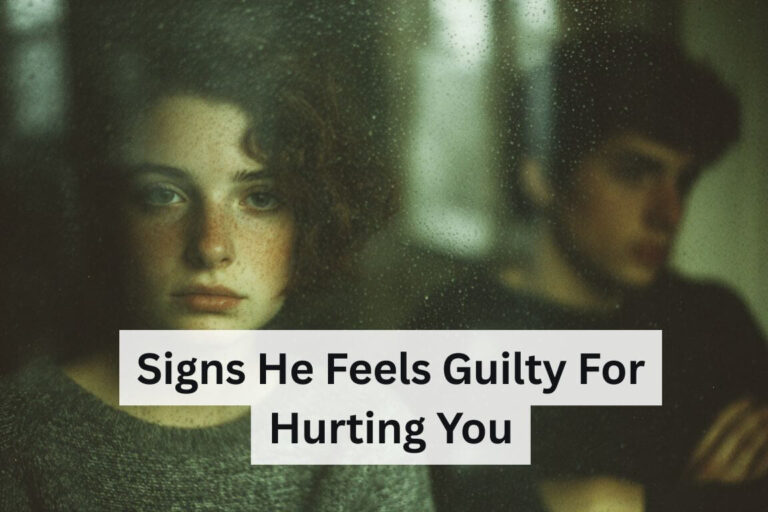When someone you care about crosses a line and causes real hurt, the aftermath can feel like navigating through fog.
You’re left wondering whether he even realizes the damage he’s done, searching for any sign that he understands the weight of his actions.
The silence and uncertainty can be maddening, but here’s what relationship experts know: guilt has a way of revealing itself through behavior, even when words fail.
His subconscious mind processes the hurt he’s caused long before his ego allows him to admit it, creating telltale patterns that speak volumes about his true awareness.
The Psychology Behind Guilt and Recognition
Before we explore the specific signs, it’s important to understand what happens inside someone’s mind when they realize they’ve caused pain.
Psychological research shows that guilt serves as an emotional alarm system, alerting us when our actions have violated our moral compass or damaged something we value.
When he knows he’s hurt you, his brain begins processing this information on multiple levels, creating a cascade of emotional and behavioral responses that often manifest before he’s even consciously aware of them.
This internal conflict explains why his actions might seem contradictory or confusing during this period.
Part of him wants to make things right, while another part might resist admitting fault or confronting the uncomfortable reality of his impact on you.

1. His Communication Style Shifts Dramatically
One of the most telling signs he’s aware of the pain he’s caused is a sudden change in how he communicates with you.
You might notice he’s become more careful with his words, speaking softer than usual, or perhaps he’s overcompensating by being unusually attentive to your messages.
This shift isn’t accidental. When guilt settles in, it influences every interaction. He might start texts with more thoughtful greetings, ask about your day with genuine concern, or avoid topics that could potentially upset you further.
The casual, sometimes thoughtless way he used to communicate has been replaced by something more deliberate and considerate.
Some men become almost overly polite during this phase, treating conversations like delicate negotiations rather than natural exchanges.
If you’ve noticed this kind of careful tiptoeing around you, it’s often because he’s hyperaware that his words have power to hurt you again.
2. He Makes Subtle Attempts at Compensation
Actions speak when words fail, and a man who knows he’s hurt you will often try to balance the scales through gestures both big and small.
These compensatory behaviors might include unexpected acts of service, thoughtful gifts that seem to come out of nowhere, or suddenly being available in ways he wasn’t before.
But here’s what makes these gestures particularly revealing: they’re often connected to the specific way he hurt you.
If he was emotionally unavailable, he might suddenly become more present and engaged. If he was dismissive of your feelings, he might start asking more questions about your emotional state.
The key is recognizing that these aren’t random improvements in his behavior. They’re targeted attempts to address the void his actions created, even if he hasn’t explicitly acknowledged what happened.
3. His Body Language Tells a Different Story
Sometimes the most honest communication happens without words. When he knows he’s hurt you, his body language often betrays his internal state before his mouth catches up.
You might notice him avoiding eye contact during conversations, his shoulders carrying tension they didn’t have before, or fidgeting when you’re in the same room.
Physical discomfort around you is a powerful indicator of psychological discomfort with his actions. He might seem restless, unable to settle into his usual relaxed demeanor when you’re present.
Some men develop nervous habits during this time, like running their hands through their hair more frequently or having trouble sitting still during conversations.
These subtle physical cues are his nervous system responding to the stress of knowing he’s damaged something important to him.
His body is literally uncomfortable with the situation, even if his pride prevents him from addressing it directly.
4. The Defensive Wall Goes Up (Or Comes Down)
Guilt manifests differently in different personalities, and nowhere is this more apparent than in defensive responses.
Some men become noticeably more defensive when the topic of your relationship or his recent behavior comes up.
They might deflect conversations, change subjects abruptly, or react with unexpected irritation to seemingly innocent comments.
Paradoxically, other men do the complete opposite. They drop their usual defensive barriers and become surprisingly vulnerable or open to criticism.
If someone who typically deflects accountability suddenly starts accepting blame for unrelated things, this overcorrection often signals awareness of a larger issue he’s not ready to address directly.
Both responses indicate the same thing: he’s emotionally activated by the knowledge that he’s hurt you, and his usual coping mechanisms are either working overtime or have temporarily shut down.
5. His Social Media Behavior Changes
In our digital age, social media often serves as an emotional outlet and a window into someone’s internal state.
When he knows he’s hurt you, you might notice changes in his online presence that seem to reflect his mood or mindset.
He might share content that feels unusually introspective or melancholic, post quotes about relationships or regret, or perhaps go completely silent on platforms where he’s usually active.
These digital breadcrumbs often tell the story his verbal communication isn’t ready to share.
Some men become more attentive to your social media activity during this time, liking posts they might have previously ignored or watching your stories more consistently.
This increased digital attention is often their way of staying connected when they’re not sure how to bridge the gap in person.

6. He Seeks Validation or Reassurance Indirectly
A man who knows he’s hurt you but isn’t ready to address it directly often seeks reassurance through indirect channels.
He might ask mutual friends about your wellbeing, inquire about your mood or recent activities, or seem particularly interested in whether you’ve mentioned him to others.
This information-gathering behavior serves two purposes: it helps him gauge the extent of the damage he’s caused, and it provides him with a sense of your current feelings toward him without requiring him to have a vulnerable conversation.
You might also notice him seeking validation about his character in general. He might share stories that highlight his good qualities, bring up past times when he was supportive or caring, or seem unusually concerned about how others perceive him.
This behavior often stems from internal doubt about whether he’s fundamentally a good person after causing someone he cares about pain.
7. The Quality of His Presence Changes
When someone knows they’ve hurt you, it affects not just what they do, but how they exist in your space.
You might notice that when he’s with you, he seems more attentive than usual, almost hypervigilant about your reactions and emotional state.
This heightened awareness manifests in small ways: he might notice changes in your mood more quickly, respond to subtle cues he would have missed before, or seem particularly tuned in to your nonverbal communication.
It’s as if his guilt has sharpened his sensitivity to your emotional experience.
Conversely, some men become more withdrawn or distant when they’re processing guilt. They might be physically present but emotionally absent, lost in their own thoughts about the situation.
This kind of distracted presence is equally telling, it shows his mind is occupied with the weight of what happened between you.
8. He Initiates Conversations About “Hypothetical” Situations
One of the more subtle signs of awareness is when he starts bringing up hypothetical scenarios that closely mirror your actual situation.
He might ask your opinion on relationship dilemmas that friends are “supposedly” facing, or share articles or stories about couples working through difficult times.
These aren’t coincidences. He’s often testing the waters, trying to understand your perspective on situations like yours without directly admitting his role in creating one.
It’s his way of gathering information about your values, boundaries, and potential paths forward while maintaining some emotional distance from the reality of his actions.
Pay attention to these seemingly casual conversations. They often reveal more about his internal processing than his direct communications do.
9. His Timing and Availability Pattern Shifts
Guilt has a way of rearranging priorities, and you might notice changes in when and how he makes himself available to you.
He might suddenly be more responsive to texts, available for calls at times when he previously wasn’t, or seem to have cleared space in his schedule that wasn’t there before.
This isn’t always about grand gestures. Sometimes it’s as simple as responding to messages faster than usual or being more flexible about plans.
The shift indicates that maintaining connection with you has become more important to him, likely because he’s aware that connection has been damaged.
Some men go the opposite direction, becoming less available as they process their guilt privately. But even this withdrawal often follows a pattern that suggests internal struggle rather than indifference.

10. He Brings Up Memories Differently
When someone knows they’ve hurt you, it changes how they relate to your shared history. He might start referencing good memories more frequently, as if to remind both of you that your relationship has positive elements worth preserving.
These memory references often carry subtle weight. He’s not just reminiscing, he’s rebuilding a narrative that includes both the good times and his awareness that recent events have threatened that foundation.
You might notice him mentioning times when he supported you, made you laugh, or was there for you during difficult moments.
This isn’t manipulation (though it can feel like it), it’s often his way of reassuring himself that he’s capable of being good to you, despite evidence to the contrary.
11. His Response to Your Pain Becomes More Immediate
One of the clearest indicators that he knows he’s hurt you is a heightened sensitivity to signs of your distress.
If you seem upset, sad, or withdrawn, he might respond more quickly and with more concern than he typically would.
This hypervigilance stems from guilt-induced anxiety. He’s watching for signs that he’s caused additional pain, and he’s more motivated to address your distress because he knows he bears responsibility for at least some of it.
You might notice him asking “Are you okay?” more frequently, or seeming particularly attuned to changes in your mood or energy.
This increased emotional attentiveness is often proportional to his level of awareness about his impact on you.
12. He Demonstrates Changed Priorities
When guilt settles in, it has a way of clarifying what really matters. You might notice that he’s suddenly more willing to compromise on things that used to be non-negotiable, or that he’s making choices that clearly prioritize your relationship over other competing interests.
This might look like choosing to spend time with you instead of engaging in activities he previously prioritized, being more flexible about decisions that affect both of you, or showing consideration for your preferences in ways he didn’t before.
These behavioral changes often feel too good to be true, and it’s natural to wonder whether they’ll last.
The key is recognizing that they indicate his awareness that he needs to rebuild trust and demonstrate that you matter to him.
13. He Shows Signs of Internal Struggle
Perhaps the most telling sign of all is evidence of internal conflict. He might seem more moody or contemplative than usual, experience changes in his sleep or appetite, or appear to be wrestling with thoughts he’s not ready to share.
This internal struggle is the hallmark of someone grappling with guilt. He knows he’s hurt you, he likely regrets it, but he may not yet know how to bridge the gap between acknowledgment and action.
You might notice periods where he seems on the verge of saying something important but doesn’t follow through, or moments where his expression suggests he’s processing complex emotions.
This visible internal work is often the precursor to more direct acknowledgment and attempts at repair.

What These Signs Really Mean
Understanding these signs isn’t about keeping score or building a case. It’s about recognizing that awareness is often the first step toward change and healing.
When he knows he’s hurt you, it creates an opportunity for growth, deeper understanding, and potentially stronger connection.
However, awareness alone isn’t enough. These signs indicate that he’s processing the impact of his actions, but they don’t guarantee that he’ll take the next steps toward accountability, genuine apology, and changed behavior.
The most important thing to remember is that your healing doesn’t depend on his recognition of the pain he’s caused.
While it can be validating to see these signs, your wellbeing should never hinge on someone else’s emotional journey or timeline for growth.
Moving Forward with Clarity
Recognizing these signs can provide valuable insight into his internal state, but they’re just one piece of a larger puzzle.
The question isn’t just whether he knows he hurt you, but whether he’s willing to do the ongoing work of repairing the damage and building something healthier together.
Trust your instincts about what you observe. If these signs align with other positive changes in his behavior and communication, they might indicate genuine growth and remorse.
If they exist alongside continued hurtful behavior or emotional unavailability, they might simply reflect temporary guilt rather than lasting change.
Ultimately, actions sustained over time will tell you more than any single sign or gesture ever could. While it’s natural to look for evidence that he understands your pain, remember that your worth and your healing are not contingent on his level of awareness or regret.
The most powerful position you can take is one where you recognize these signs for what they are while maintaining clear boundaries about what you need to feel safe and valued in any relationship moving forward.


